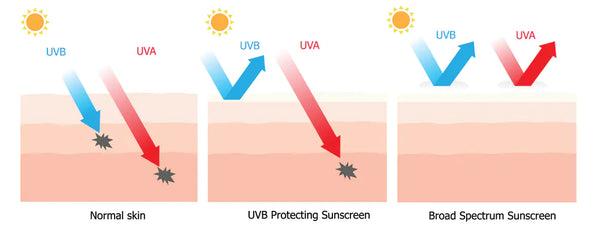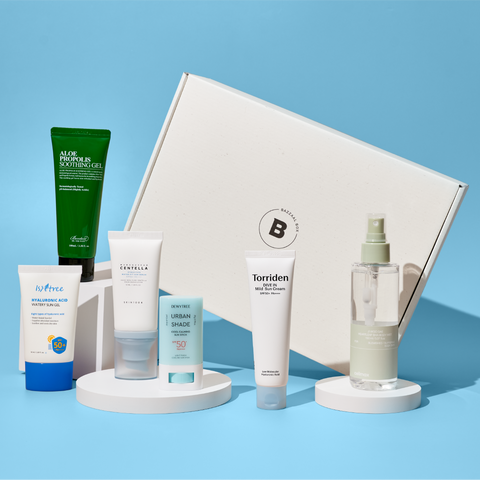SUMMER CARE: Chemical vs. Physical Filters - What’s the Difference?

Seems like everyone has now hopped on the sunscreen trend. Have you? Well let us introduce you to all things SPF. In a world full of sunscreen it's so hard to find one that’s right for you. In all honesty, the best sunscreen is the one you’ll want to put on and add to your skincare routine.
Picking a sunscreen can all depend on what skin type you have, where you are going, or even how your skin reacts. Because of this, BAZZAAL Team decided to make it easier for you, so you can get to know the basics.
There are three different types of sunscreen formulations available on the market. After reading this, you’ll figure out whether mineral, chemical, or hybrid sunscreens are right for you.
UVA and UVB Protection
The most important part when looking for any sunscreen is finding one that offers broad spectrum protection. Broad Spectrum means that it offers both UVA and UVB protection. Think of UVA, as UV that causes Aging, and UVB as UV that causes burning. By getting sunscreen that is broad spectrum we are protecting our skin from burns and wrinkles.

Physical Sunscreen
Physical sunscreens are made up of mineral filters that act as a physical barrier on the skin, reflecting most UV light.
The two main types of mineral filters are:
- zinc oxide
- titanium dioxide.
Most people pick physical sunscreens when they are dealing with skin sensitivity or are looking for something water resistant. While they have these benefits, it can sometimes be hard to find a mineral sunscreen that does not leave a white cast or clog pores, since they tend to be less emollient in texture. Still, that doesn’t mean there is not a perfect one out there for you, because it’s all about formulation.
An example of a physical sunscreen can be found within our Sun Box.

Torriden Mild Sun Cream SPF 50+ PA++++
This sunscreen uses Zinc Oxide as its main physical filter, in addition to hyaluronic acid, allantoin, panthenol, ceramides, green tea, and turmeric, as an all in one packed with antioxidants to calm skin and fight free radical damage.
Chemical Sunscreen
Chemical filters work by absorbing UV rays and breaking them down releasing heat.
Some chemical filters include:
- Oxybenzone
- Octinoxate
- Homosalate
- Octisalate
- Octocrylene
- Avobenzone
These are just a few of the more popular chemical filters, but there are even more, as new chemical filters are being created.
The main reason why people pick this type of sunscreen is because they tend to not have any white cast on the skin, blend instantly, and tend to perform better underneath makeup. Another positive is that these formulations tend to be a lot more hydrating, which is great for dry skin. However, the cons is that most chemical filters are not waterproof, which means we recommend for you not to go swimming or sweat when using these. Along with this, some people do experience slight stinging or irritation with these filters, because they tend to be stronger than mineral filters that are available. It’s best to just pay attention to what your skin is telling you, and start by slowly incorporating these filters into your routine.
An example of a chemical sunscreen can be found within our Sun Box.

SKIN1004 Madagascar Centella Hyalu-Cica Water-fit Sun Serum SPF 50+ PA++++
This sunscreen uses Diethylamino Hydroxybenzoyl Hexyl Benzoate, Ethylhexyl Triazone, and Methylene Bis-Benzotriazolyl Tetramethylbutylphenol as its main chemical filters, along with a blend of skin soothing ingredients like Niacinamide, Centella Asiatica, and Hyaluronic Acid.
Hybrid Sunscreen
Hybrid Sunscreen? You guessed it! It's a mix of both chemical and physical filters that offer the benefits of both filters. There have even been studies showing that this type of sunscreen is even more effective at protecting against UV damage. This blend usually contains about 7% zinc oxide, along with one or more chemical filters. Mixing these within a formulation results in a higher SPF, however make sure that you are not mixing two different sunscreens as this can result in a chemical reaction with certain filters.
Now that you know all about SPF 101, what type of sunscreen is on your wishlist?





I love this box! Perfect supply for the entire summer…
Leave a comment